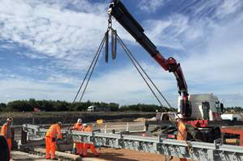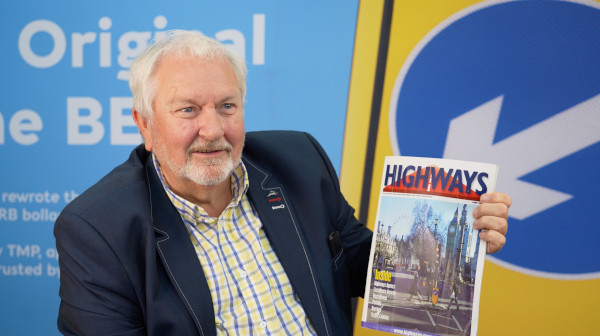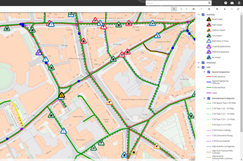A number of major local road schemes are hanging in the balance while authorities are left unsure if ministers will stump up the extra cash pledged in the wake of cutting back HS2.
As Highways has reported, as part of the Network North announcement, the Department for Transport (DfT) said that it would increase its contribution to ‘most' Large Local Major (LLM) and Major Road Network (MRN) schemes from to 85% to 100%, at a cost of £1.3bn.
However, this is based on the projected cost at outline business case (OBC) stage, which may have risen significantly since they were submitted, leaving highway authorities to find cash to bridge the gap.
A number of schemes may not benefit from the uplift because work has already started on a reduced scale for instance, or because the cost estimate on which the 85% contribution was based had already increased at the time the OBC was approved.
The DfT told Highways that it would discuss individual schemes with local authorities, and details related to funding will be confirmed ‘in due course' – widely understood to mean there is no fixed date.
One scheme with MRN funding has already started on a reduced basis after cost increases took it beyond its original budget. Last year, the DfT pledged £35.3m for essential maintenance to the Tyne Bridge in Newcastle and the adjacent Central Motorway.
Half of the £41.4m overall budget was due to be spent on the bridge but the cost rose to around £32.6m, apparently due to inflation rates and extra work that was needed.
Newcastle City Council said in August that with a fixed funding package it had ‘prioritised the spend to fully restoring the Tyne Bridge due to the importance of this iconic structure'.
Jane Byrne, the council's cabinet member responsible for transport, said: ‘The inspection works also revealed more extensive repairs required to the Tyne Bridge than initially anticipated, which has also added to the length of the programme.
‘This has meant reprofiling the Central Motorway upgrade to reduce the scope of works and concentrate on the viaduct section until further funding is secured.
‘However, we would stress that this is a four-year programme and we are actively seeking additional funding to allow the full scope of works to be completed.'
A council spokesperson told Highways: ‘We are aware of additional funding for the Major Road Network fund as part of the Network North announcement. At this stage, we have not had any official notification and await confirmation from the Department of Transport.'

Another scheme to have been cut back because the original funding package had been exceeded was Nottinghamshire County Council's A614/A6097 Corridor scheme, which was originally set to cost £28.6m.
This was due to be met by £24.3m from the DfT, with £2.55m from the county council and £1.75m from developer contributions.
However, costs rose to £45.3m, leading to a proposed junction improvement at Mickledale Lane – one of an original six – being dropped.
Late last month, Cheshire East Council's Highways and Transport Committee agreed to submit a full business case for £46.8m for the Middlewich Bypass. The figure was calculated when the cost of the scheme was £56.9m, but this has now risen to £95.74m.
Councillors agreed to put in a further £3.24m with the expectation that £1.7m would come from HS2, before the scheme was cancelled.
Highways and Transport Committee chair Craig Browne told Highways: ‘We submitted our full business case for the delivery of the Middlewich Eastern Bypass project to the Department for Transport last week, following the recent Highways and Transport Committee meeting.
‘We are currently awaiting confirmation from them of any potential uplift in funding following the recent Network North announcement.'
This month the DfT approved the OBC for the Norwich Western Link road, with a £213m contribution representing 85% of the current £251m cost of the Large Local Major (LLM) scheme.
The cost of the scheme has already risen from £153m in a 2020 strategic outline business case to £198m when the OBC was submitted in 2021. Last year, the council submitted an addendum to the OBC revealing that the projected cost had risen to £251m.
Councillors in Norfolk also agreed an OBC for the West Winch Housing Access Road in August, despite the scheme facing a funding gap of £16m even if a £50m bid for MRN is successful.
A further £14.65m was expected from Homes England, and £3.45m from local and developer contributions but a report for the council's cabinet meeting gave an updated project cost of £84.47m, an increase from the original estimated cost of £64.73m in March 2021.
While DfT funding equivalent to 100% of the earlier cost would get the scheme close to the new total, this would exceed the current £50m ceiling for MRN schemes.
In the spring, Norfolk invited bids for a £30m contract to build the Long Stratton Bypass, which in 2021 received a pledge of £26.2m MRN funding towards a projected cost of £37.4m that subsequently rose to £46.232m.
In this case, the original local contribution and a potential 100% contribution based on the original estimate could meet the increased cost.
































